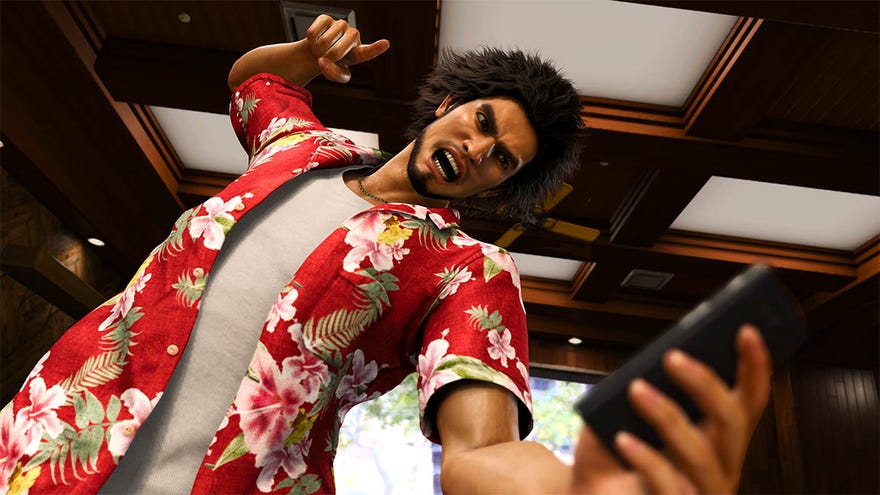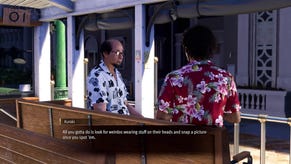Like A Dragon’s localisation team explain how they bring the series’ singular storytelling to the west
“We love kink-based wordplay here at Sega”
“Ever since the very first Yakuza on PS2, the Like A Dragon series has always tried to capture the cultural zeitgeist of Japan, reflecting and satirising whatever’s trending around when the game comes out. This means that the way people speak in Like A Dragon is constantly evolving to match the times,” says Dan Sunstrum, senior translator at Ryu Ga Gotoku’s localisation team. Keeping things current is, says Sunstrum, “a challenge in some ways but also means we’re justified in using modern English slang to match, whereas such modernisms might feel out of place in a game set in a completely fictional world.”
Sunstrum uses an example from the studio’s latest, RPS Bestest Best winning RPG Like A Dragon: Infinite Wealth, where permed protagonist Ichiban Kasuga meets a dating app designer. “The app’s creator goes on a mini-rant about ungrateful, entitled users, complaining how when anything goes wrong they’re quick to demand wabi-ishi,” slang for free premium currency. “This would have been a tricky word to localise, but it was made easy by the fact that fans of gacha games had already done it for us: they refer to them as ‘apologems’, and that’s what we ended up using in the game.”
Conversely, says Sunstrum, some of the trickiest words to localise are the common ones, since each instance generally needs a creative solution to fully capture the context it’s used in. “One of these words for me personally is amaeru, a verb that has no direct translation in English but which I will roughly describe as ‘acting in a way that communicates that you want someone to take care or dote on you’.” It’s usually used for scenarios like a child asking a parent for a piggyback or a treat, “but is also versatile enough to be used for decidedly adult characters like Kiryu.”
Early in Infinite Wealth, Kiryu drops a personal bombshell, and Kasuga tries to convince him to take it easy, saying: ‘We’re here, after all. You should rely and amaeru on us more.’ Of course, says Sustrum, “Kasuga isn’t suggesting Kiryu act like a fussy baby and demand attention. He’s saying it’s okay to ask for help when he’s struggling. Practically every instance of amaeru needs a translation crafted for the specific context it appears in, and the final edit for this line ended up as: “We're here too, you know? So share the load... We got your back.”
“There are a lot of factors that affect how to render a sentence – such as characterization, emotion, projection, and timing – to the point where no one would translate or edit something the same way,” says Josh Malone, Ryu Ga Gotoku’s localisation team’s lead editor. “What I like to look at is ‘flow’, the natural progression of dialogue. Are these characters talking past each other, or do their thoughts and words connect in a believable, well-constructed way?” Accurate localisation, says Malone, needs as much context as possible. The team look at a given scene as a whole, and consider how each line affects and is affected by others.
He gives a simplified example of how the process might work from start to finish:
Japanese: ちゃんと仕事してくれりゃチップもはずんだのによ。悪りぃが金は払わねえぞ。……封筒、返してくれや。
Translation: If you'd have done your job right, I would've given you a generous tip. Sorry, but now I'm paying you nothing... And give me back my envelope.
Edit: Y'know, if you just did your job, you'd have got a fat tip. But now all you get is a fat lip. Oh, and gimme my envelope.
“This is right after Ichiban fights Tomizawa, a crooked cabbie who attempted to rob him at gunpoint. Does the Japanese line mention a fat lip at all? No. Does the English line still convey the same information while respecting the scene, the characters, and the creators’ original vision? Absolutely.” He continues, “it conveys that Tomizawa’s not getting paid a dime, and is logically consistent with Tomizawa’s slightly bloodied, beaten-up state. Could Ichiban just as easily have said, “But I ain’t payin’ you shit now” in his usual crass way? Sure, but he would've sounded like any other trash-talking thug, and this is one of many moments that highlight that, among all the street punks and underworld goons he blends in with, his charisma alone is enough to set him apart.”
“There was a really tricky line early-ish in the game where Kasuga gets arrested for public indecency and is being interrogated by a Hawaiian police officer,” says Sunstrum. In Japanese, the officer says: “I hear the word “hentai” comes from Japan. I guess the birthplace of that word is on another level, huh?” What the writers likely didn’t realise, he continues, is that hentai has a different meaning in Japan, referring to a pervert or deviant rather than porn directly. “We needed to massage this line a bit to make the joke work for our audience. I want to say this line went through three or four different revisions — some of which tried to keep “hentai” in — before we landed on the current version that plays on the stereotype of Japan being ‘weird’: “But hey, your country's famous for weird shit. Like the anime porn, or the panty machines, huh?”
Most substory names contain some sort of pun, and the trick here is to keep things tonally consistent with the content of the quest. “As much as we love kink-based wordplay here at Sega,” says Malone, it would miss the point for certain stories. “For instance, the substory title “Let It Snow” (Snow Smile/スノースマイル in Japanese) is not a pun, but a song reference that encapsulates the substory’s mood and objective. Perhaps it’s something a husband might hear in his mind as he shares a tender moment with his beloved, ageing wife while the “snow” falls around them,” says Malone. “It wouldn’t have been right to, say, reference a certain man-baby patriarch also featured in the story and call it something like “Baby’s First Snow”, “Here Today, Gondawara”, or “Diapers and Diamond Dust.”
As that substory so aptly demonstrates, Infinite Wealth relishes the series’ trademark tug-of-war between heartfelt and goofy, and perhaps the best example of the latter is Sujimon - a parodic love letter to both Pokémon and Dragon Quest. Like those properties, LAD doesn’t hold back with the pun-based enemy names. Sujimon, says Malone, are “sort of a bizarre thought experiment about what kind of RPG enemies you’d ‘realistically’ encounter on the streets of Japan. Given the setting and story of the Like A Dragon franchise, we’d rather lean into any culturally specific references than shy away from them, though in order to land that perfect name, there are of course some liberties that may need to be taken – liberties that that still communicate the design of the Sujimon as intended by the creator.”
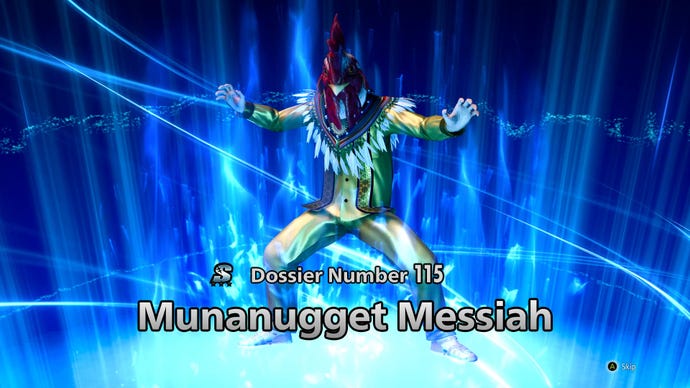
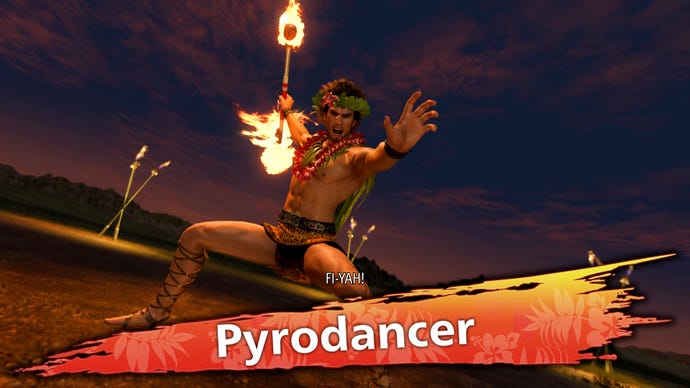
Malone says a good example of this is the ‘evolutionary line’ for the lubed-up enemies in Ijincho. “In Japanese, you’ve got Lotion-Lathered (ローションまみれ), Lotion-User (ローション使い), and King Health (キングヘルス), ‘health’ in this case meaning ‘men’s health’, a euphemism in Japan for erotic massages. Nuanced, no?” Playing the game in English, you’ll encounter these Sujimon as City Slicker, Grease Monk, and Pornogra-Pharoah. “The first two enemies based on slipperiness, the final enemy based on pervert status, just like in Japanese. Kudos to our lead editor John Moralis for divining these strokes of brilliance; we tend to pull him off whatever project he’s on for this specific purpose.”
Given that Ichiban’s imagination is so deeply rooted in the Dragon Quest series, says Malone, the team often use those games as a guidepost. “Dark Santa/ダークサンタ becomes Krass Kringle. Implant Ogre/インプラントオーガ becomes Modgoblin. Needleraiser/ハリ・レイザー becomes Weltraiser.” The Needleraiser is a perfect example, says Malone, since ‘needle’ in Japanese is ‘hari’. It’s “phonetically similar to ‘hell’, and once you see the Sujimon in question, you know exactly where the inspiration came from.”
There are definitely moments though, says Malone, where a joke or culturally specific reference can leave the team deliberating how to render it in English. This becomes especially interesting when slang terms are involved. Malone gives the example of the opening scene of Lost Judgement. The hero, Yagami, is tailing a college kid who heads into a mysterious room referred to as “shikinoma” (しきのま). Yagami overhears this, so without actually reading the kanji, the meaning remains ambiguous.
“Being that the room is restricted access, and run by a shady-looking group, Yagami asks Kaito for his thoughts, and Kaito literally replies with: “Gambling halls are also called ‘shiki’ (敷), so ‘shiki no ma’ (敷の間) could be intended as a code word.” This literal translation, says Malone, is “a bit unwieldy in English”. The final edit ended up as follows:
"Well, a betting man would say he's gambling. If it's a members-only building with goons posted on every corner... I'm telling you now, the tatami room ain't no tea shop.”
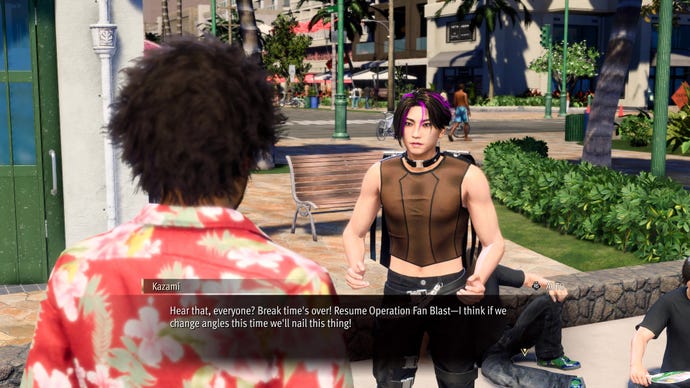
“We could’ve played it straight, but we decided to read between the lines here and look at the purpose of the dialogue,” says Malone. “What we really needed was a clue about this room that wouldn't break immersion, something our audience would recognize.” They settled on ‘tatami room’, which are still “fairly ubiquitous” in Japan. The word might also conjure a tea ceremony, “Another Japanese custom known worldwide.” Of course, says Malone, “a cho-han parlour might also utilise tatami to preserve that traditional feel, but again, only a gambler (or an ex-yakuza) would know something like that.”
It’s not only this sort of streetwise awareness the team have to be cognisant of with many of their characters. On top of regular colloquialisms, there are also region specific, and even yakuza specific terms and dialects.
“The yakuza do actually have a good deal of slang/jargon they use – at least in fiction; I’ve never talked to a real one,” says Sunstrum. “When coming into the Like A Dragon series for the first time it takes a bit of time to onboard these terms if you weren’t familiar with them already.” Sunstrum gives some examples: ‘Katagi’ is “someone who is not part of the yakuza; a civilian. Literally ‘upstanding person’,”; ‘Mikajime’ is protection money, literally ‘management/oversight’; ‘Shinogi’ is “a source of income, usually through dubious means; a racket,” literally, ‘something you do to endure hardship’.
“Some of these words we tend to translate one-to-one, like katagi becomes civilian, but others like shinogi have to be handled case-by-case,” says Sunstrum “In some lines we do use ‘racket’ or closely related words like ‘hustle’ or ‘scheme’, but in some cases we also used words like ‘operation’ or even ‘source of income’.”
Fans of Yakuza 0 will know that the story frequently switches between Tokyo and Osaka, the latter of which has its own distinctive dialect, called Kansai. “The most important thing about rendering a dialect is replicating its ‘flavour’ or ‘character’ in English in the same way it might be perceived in Japan,” says Malone. “For instance, Osaka dialect tends to be fast-paced and flamboyant while Hiroshima dialect tends to be slow with a country twang, though how exactly this comes across varies from person to person. We have style guides that lay out the details on how to achieve a baseline for these dialects in terms of word choice and grammar.”
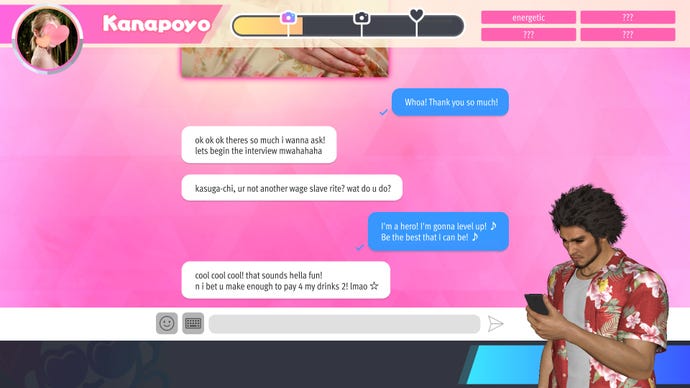
It’s impressive to think about the huge chain of talent and disciplines that even a single line goes down before it gets to us. Of course, it doesn’t end with the page. “As for Japanese-speaking Hawaiians, their Japanese resembled the usual Tokyo dialect – it's the Hawaiian Pidgin and ʻŌlelo Hawaiʻi that we endeavoured to replicate. This could not have been done without the input of our voice acting talent in Honolulu, whose adaptations of the original script resulted in a vibrant mix of expressions that faithfully represents the local sound.”
Wherever the series ends up going next, though, both Ichiban and the series’ tributes to the medium of games itself likely won’t be far behind. “One example that comes to mind is the phrase 成り上がる (nariagaru), a single verb which when translated comes out to the wordy “to move up in social status,” says Sunstrum. “This phrase comes up a few times in Yakuza: Like A Dragon, notably the scene where Kasuga shares with Nanba his childhood dream of becoming a hero.” This scene, however, had strict timing requirements, so to convey this without getting overly wordy, “we drew a comparison between moving up in life and levelling up in a video game.” It’s something they were only able to pull off because of all the Dragon Quest references.
“We ended up using the same localization in Kasuga’s karaoke song, The Future I Dreamed Of. The chorus starts with “nariagaru ze”, which became ‘I’m gonna level up.”
